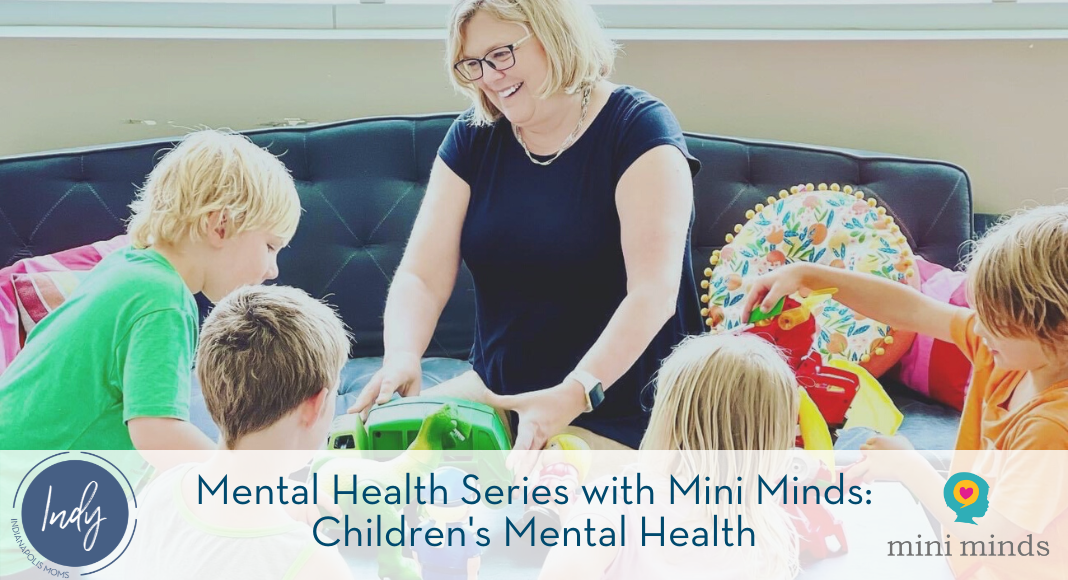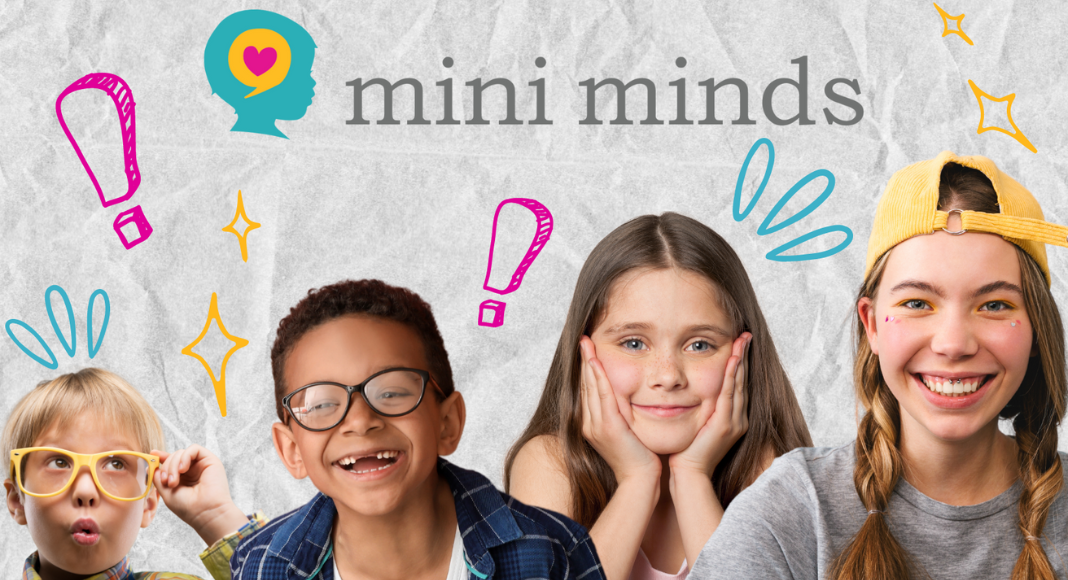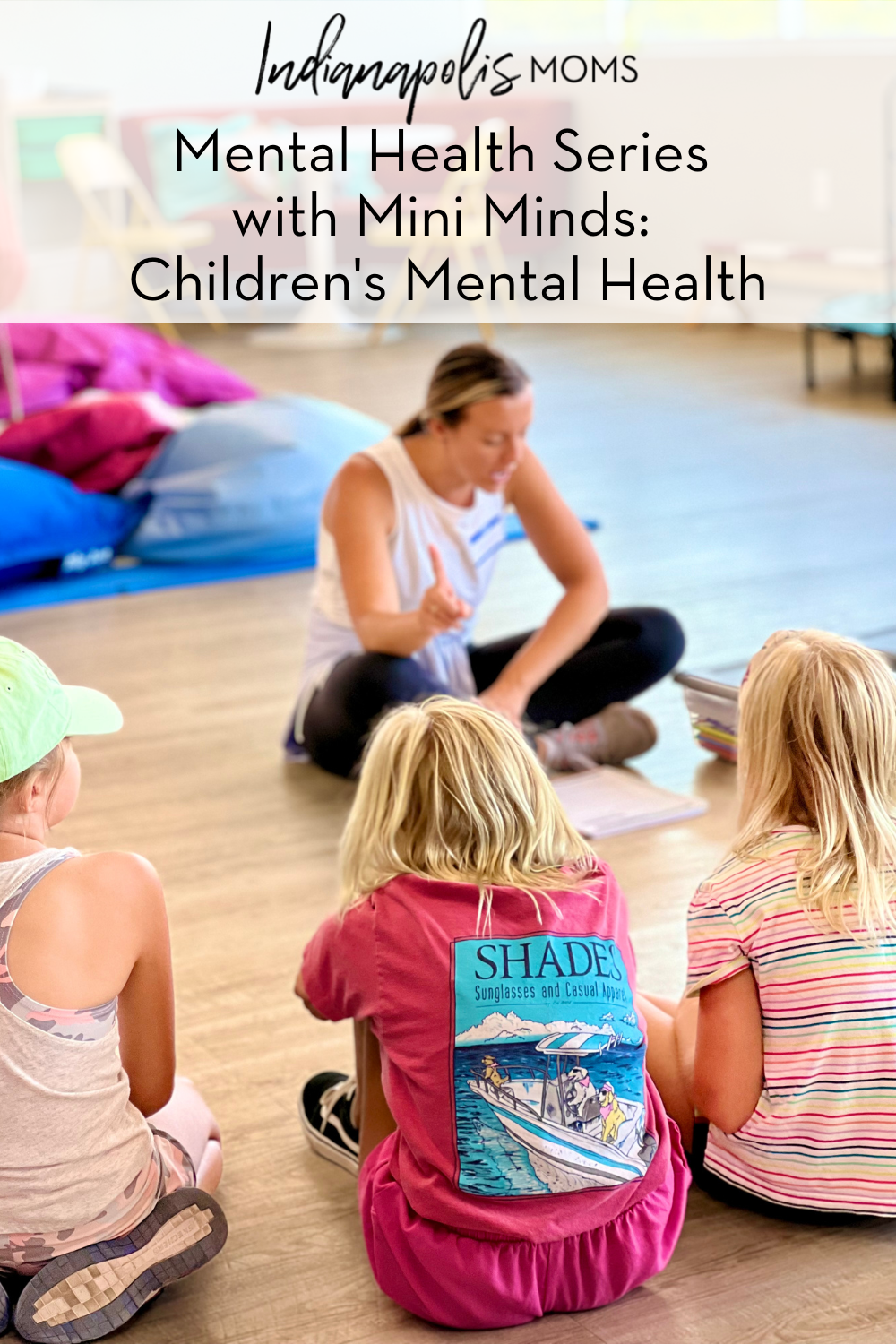We are excited to kick off our three-part mental health series with Mini Minds. Located in Carmel, Mini Minds is a therapy and mental health service provider. We recently sat down with owner Megan Peck and clinical director Kate Norman, who are both passionate about children’s mental health. They answered our questions about this important topic and the services Mini Minds provides Indianapolis area families.

What are your roles within Mini Minds and what services do you provide to Indianapolis area families?
Not only is Peck the owner and Norman the clinical director, they are both mental health therapists leading a team of speech therapists, occupational therapists, and additional mental health therapists. Their mission at Mini Minds is to empower families to raise children who thrive. They work to do that by constantly educating themselves on the most up-to-date research, specifically brain and body research, as well as updated techniques and therapy styles to help support local families.
“I think what separates us from other locations in central Indiana is not only do we offer individual therapy, but we also offer community classes,” says Peck. “Just to reach the entire community and to educate everyone on critical social, emotional, and executive functioning skills.” Peck says these community classes empower families to help their children grow those skills – using growth mindset, mindfulness, and meditation – to help with anxiety and common mental health issues with children.
What are some signs of anxiety in children?
The main thing to know about anxiety in children, says Norman, is it involves a perception of danger. Anxiety in children thrives on unpredictability or unexpected situations and anxiety will flare up when they think their fears have become a reality. She gives an example of a radio being unexpectedly turned up really loud. When that happens, a child might panic and start showing body symptoms of anxiety.
Some common body symptoms include sweaty palms, tapping or fidgeting feet, butterflies in their stomach, increased heart rate, nail biting, and even irritability and anger. Irritability and anger can stem from not being able to properly communicate anxiety, so this is common in young children.
Everyone experiences anxiety differently in their body, and Mini Minds educates children on how to recognize those individual body symptoms of anxiety and how to calm them down. Peck continues by saying, “Very rarely will a child come up to a caregiver and say, ‘Hi. I’m anxious, please help me.’ They don’t always have that awareness of anxiety because it’s rooted in fear and unpredictability.” You can’t feel a worried thought, but you can feel what is happening in your body so kids are taught to identify their body symptom and how to calm down. “We’ll talk a lot about ‘dropping out of the brain and into the body’ first and then going back up to the brain because when the brain is in that state of fear, anxiety, worry, anger, irritability, it’s not thinking logically or clearly,” says Peck.
As parents, is there something we can do to help with our child’s anxiety?
One of the most common mistakes parents make is immediately minimizing fears in their children. As a parent or caregiver, when a child comes to you with a fear, our first gut response can often be, “Don’t worry about it, it’s fine, you’re going to be okay.” Some examples Peck and Norman give are irrational fears, like an alien invasion, or more natural feelings children can have, like when they say, “I stink at this, I’m stupid.” We jump to soothe them by negating what they say.
This response, never meant to hurt our child’s feelings, can often create greater discord, says Peck. Responding in this way may imply that you are dismissing your child’s feelings, or that you don’t understand or want to help. Peck and Norman suggest helping your child recognize what is going on inside their body and helping their body symptoms calm down. Once you achieve that, your guidance will be better well received. Sitting in the moment and talking through your child’s fears is more productive. “That validation of feelings is important,” says Norman. And lean into that validation longer than it feels comfortable in order to allow your child to see you as an ally who understands and wants to help.
When I know there is a big change coming in my child’s life, what can I do to prepare my child to help ease anxiety?
The best way to jumpstart that process is to talk about it, says Norman. Start a conversation by asking questions. This allows you to clarify things and for them to begin visualizing what they are about to experience. The more open discussion you can have, the better. “I often tell families that the greatest conversations I have with my kids about feelings happen in the car,” says Peck. “Because they’re a captive audience! They’re in seatbelts and they can’t go anywhere. And also, you don’t necessarily have that direct eye contact. It takes a lot of the pressure off, and you can have those more open conversations.”
Norman suggests preparing your child for anxiety by giving the anxiety a name, and talking to that anxiety. For example, a child could name their anxiety Bob. Anytime Bob flairs up, parents can work with their child to tell Bob to calm down. This helps the child to categorize when a thought or fear becomes anxiety. Frame it like, “Okay buddy, we can expect Bob to be with you during your first day of school. Talk back to your anxiety and tell Bob he can go away.”
Your child is the only one who understands what they are thinking and feeling. Providing safe spaces for your child like the ones above helps to create awareness and confidence. To learn more about Mini Minds and to make an appointment, visit their website here or give them a call at (317) 564-8332.
Stay tuned for Part Two of our mental health series when we will discuss adolescent and teenage anxiety with Mini Minds!
Check out the full interview here and learn more about Mini Minds:
About Mini Minds










